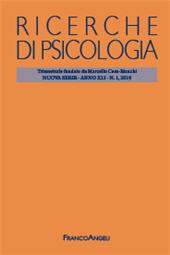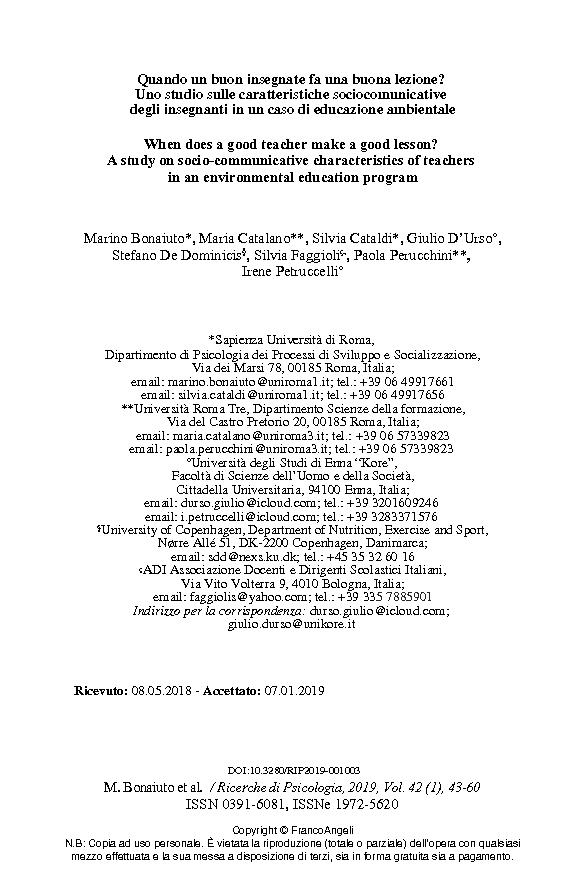2019 - Franco Angeli
Articolo
Versione Digitale
Download | Copia/incolla | Stampa
Quando un buon insegnate fa una buona lezione? : uno studio sulle caratteristiche sociocomunicative degli insegnanti in un caso di educazione ambientale
43-60 p.
- Il presente lavoro ha lo scopo di verificare se e quali modalità didattiche e interattive messe in atto dall'insegnante in classe, durante le lezioni, possano essere un fattore legato alle buone relazioni insegnanti-discente, nonché un fattore legato allo sviluppo di proficue relazioni fra pari. I partecipanti allo studio sono stati 201 studenti. Le lezioni, svolte su temi ecologici, sono state gestite da 15 insegnanti in 3 paesi diversi. Alla lezione, inoltre, assistevano anche 17 osservatori esterni esperti, formati ad hoc per il progetto, provenienti dai diversi paesi. La valutazione delle lezioni è stata effettuata mediante un pacchetto di strumenti (Toolkit for lesson evaluation) costituito da tre diverse schede di rilevazione che hanno raccolto punti di vista diversi: osservatori esterni, studenti e docenti. Agli studenti è stato chiesto di compilare due strumenti: la SGE Student Grid e il TEP-Q Etero Evaluation.
- Agli osservatori esterni è stato chiesto di compilare l'SGE Observer Grid. Dalle analisi di regressione multipla emerge che la modalità di spiegazione degli insegnanti, percepita dagli osservatori, predice positivamente le adeguate relazione tra docenti e allievi. Inoltre, la comunicazione efficace dell'insegnante e l'attenzione alla relazione da parte dell'insegnate predicono le buone relazioni tra pari. Dall'analisi di correlazione, infine, emerge come le buone relazioni tra studenti sono risultate correlate significativamente con l'uso di metodologie attive da parte dell'insegnante. [Testo dell'editore].
- The present study aims to verify if and which didactic and interactive strate-gies implemented by teachers in the classroom, during their lessons, can be a fac-tor related to good teacher-student relationships, as well as a factor related to the development of satisfying relationships among peers. The participants in the study were 201 students. Lessons, conducted on ecological topic, were handled by 15 teachers in 3 different countries. In addition, 17 observers, suitably trained and coming from the different countries involved, attended the lessons. Lessons' evaluation was carried out through a toolkit (Toolkit for lesson evaluation), which consists in three different forms related to the point of view of different participants: external observers, students and teachers. Students have completed two tools: the SGE Student Grid and the TEP-Q Etero Evaluation. Observers completed the SGE Observer Grid.
- The multiple regression analysis suggests that teachers' explanation modality, perceived by the observers, positively predicts the good relationships between teachers and students. Furthermore, teacher's ef-fective communication and teacher's attention to the relationship predict good relationships among peers. Finally, the correlation analysis highlights how good relations between students are related with the use of active methodologies by the teacher. [Publisher's text].
Fa parte di
Ricerche di psicologia : 1, 2019-
Informazioni
Codice DOI: 10.3280/RIP2019-001003
ISSN: 1972-5620
PAROLE CHIAVE
- Insegnanti, relazioni tra pari, qualità della lezione
- Teachers, peer relationships, quality of lesson
-
Nello stesso fascicolo
- Stili educativi genitoriali, benessere scolastico e rendimento scolastico in adolescenza
- Videogiochi e persistenza motivazionale : uno studio preliminare
- Quando un buon insegnate fa una buona lezione? : uno studio sulle caratteristiche sociocomunicative degli insegnanti in un caso di educazione ambientale
- Introduzione : la relazione educativa : alcune riflessioni dalla prospettiva psicologica e pedagogica
- Teacher-student interactions : measurement, impacts, improvement, and policy
- Attachment representation, mentalization, and cognitive emotion regulation strategies at school
- Riprendere a imparare, riprendere a insegnare : quali strategie per interventi educativi con studenti difficili
- Persona e relazione : per un'epistemologia pedagogica
- Assessment for Learning e Dynamic Assessment : il ruolo della mediazione nella valutazione inclusiva
- Ringraziamento ai Referee
- Norme per gli autori



